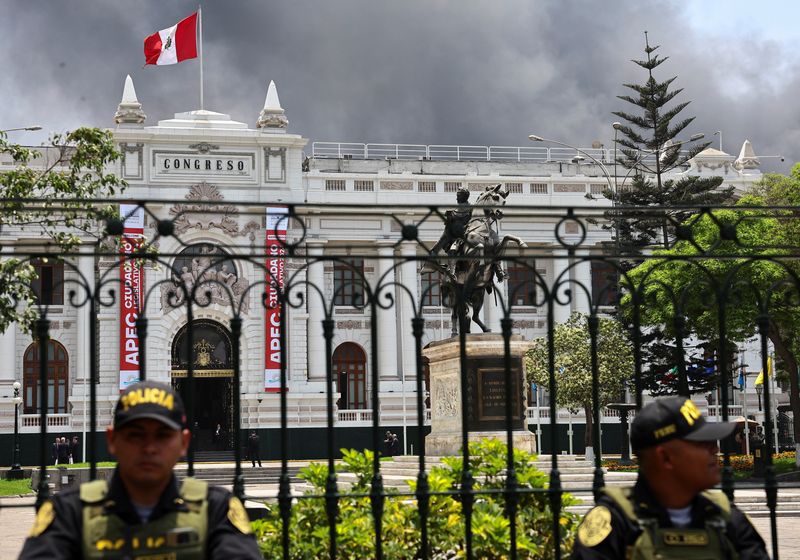Starting Latin America trip, Xi Jinping opens huge port in Peru funded by China
By Eduardo Baptista, Marco Aquino, Lucinda Elliott
LIMA (Reuters) -Chinese President Xi Jinping launched a week-long diplomatic blitz of South America on Thursday by inaugurating a massive deep-water port in Peru, a $1.3 billion investment by Beijing as it seeks to expand trade and influence on the continent.
With China's demand for agricultural goods and metals from Latin America growing, Xi will participate in the Asia-Pacific Economic Cooperation summit in Lima then head to the Group of 20 summit in Rio de Janeiro next week, where he will also make a state visit to Brazil.
Xi and Peruvian President Dina Boluarte participated on Thursday by video link in the opening of the Chancay port, about 80 kilometres (48 miles) north of Lima on the Pacific Ocean, and signed a deal to widen an existing free trade agreement.
Xi said that Chancay, a 15-berth, deep-water port, was the successful start of a "21st century maritime Silk Road" and part of China's Belt and Road Initiative, its modern revival of the ancient Silk Road trading route.
"China is willing to work with the Peruvian side to take the Chancay project as a starting point to forge a new maritime-land corridor between China and Latin America and connect the Great Inca Trail," Xi said, referring to a 15th century mountain network that joined the Inca empire.
In an opinion article in the El Peruano state newspaper, Xi said the Chancay project would generate $4.5 billion in annual revenues, create more than 8,000 direct jobs and reduce the logistics costs of the Peru-China route by 20%.
The China-controlled megaport was built by Cosco Shipping Ports and received $1.3 billion in Chinese investment for its first phase. China is expected to spend billions more as Beijing and Lima work to position it as a major shipping hub between Asia and South America.
The first ship was due to set sail from Chancay next week, transporting Peruvian fruit to China, Mario Ocharan, Peruvian director of the Chancay Chamber of Commerce, said.
China's main motivation for developing the megaport, according to Ocharan, was access to neighboring Brazil, where a new railway line is planned to carry Brazilian exports such as soybeans and iron ore to the port.
The rail project is estimated to cost $3.5 billion, according to Mario de las Casas, corporate affairs manager at Cosco Shipping Chancay Peru.
Building that link is "crucial" to improve transportation of soybeans as Brazil is the top seller of the commodity to China, he said.
GEOPOLITICAL AND ECONOMIC HEADWINDS
The inauguration of the port comes as Beijing is looking to further tap into resource-rich Latin America, amid trade tensions with Europe and concerns about future U.S. tariffs on Chinese exports from the incoming Trump administration.
Hundreds of Chinese business executives have accompanied Xi on this trip including heads of companies heavily invested in Peru such as Chinalco, which owns the Toromocho copper mine.
Robert Evan Ellis, Latin America research professor at the U.S. Army War College, said that Chancay will make shipping between Latin America and China more efficient.
Because the port can handle the biggest ships, it will reduce the need for shippers to consolidate cargo containers at intermediary points, reducing costs and handling times.
"Chancay illustrates how China seeks secure access to resources and markets and its ever more successful fight to corner global value added,” Ellis said.
China's major investment in Chancay has raised alarm bells in Washington. General Laura Richardson, former U.S. Southern Command chief, warned earlier this month that Chancay could be used by the Chinese navy and for intelligence-gathering.
U.S. anxieties about Chancay reflect a broader, decades-long shift in a region Washington long saw as its backyard. China has overtaken the United States to become the largest trading partner of countries like Peru.
China's state-backed Global Times wrote in an editorial on Monday that the port was "by no means a tool for geopolitical competition", calling U.S. accusations of the port's potential military use "smears".
Source: Investing.com
